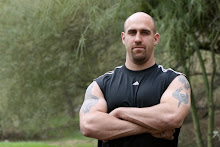When I think to my own training I can remember times when squat numbers would improve, yet, performance in sports I would enjoy would not see any improvement. Why did this occur? After really taking a look at my own training and to those that I work with I found some interesting observations.
1. Since the squat form of people can vary so greatly it is impossible to make an overall generalization if squatting is good or harmful for one's goals.
2. We live in an era where injuries, muscle imbalances, movement problems, and other physical issues play a large role in what happens during the squat. I could yell and scream about how awesome they are and how you HAVE to do them, but that isn't always the answer.
3. More important than squat numbers going up is whether or not they are leading people to the bigger picture of their overall goal.
I know for myself squatting was definitely a beneficial exercise, but I really didn't understand what I was missing till I started addressing my own weaknesses. Sports such as basketball and Strongman took a large toll on my body.
From these sports I had more than a few days where my hip would ache, I would have altered walking patterns, shoulder tightness and just didn't feel like I could progress in my training. I made the hard decision to take a break from the traditional back and front squatting and make lunging a priority in my training program.
Most people would say that I was "wussing out", but the definition of insanity is doing the same thing over and over again expecting a different result. The worst case from my own experiment? I would not get any better and possibly lose some strength. The result was much different than I expected.
After about six weeks of making lunging a strength focused lift for me I found that my hips felt better and more surprisingly my back squat went up! Why could this happen? A few things came to mind pretty fast.
1. Squatting is an easy exercise for us to think as a superior strength exercise because simply we can often handle more weight. More weight must mean more strength being built, but it is impossible to say that single leg exercises could not do the same at smaller loads. It would appear that lunges stimulate just as many, if not more muscles because of being slightly unstable. Therefore, we can't simply assume more weight equals more strength.
2. It is far more difficult to compensate on the lunge than the squat. The most common compensation is altering stride length to something shorter to remain more balanced. Outside of this pattern, it is darn hard to cheat a lunge. Many lifters know there are more than a few ways to cheat a squat.
3. You hit your weak points! I can't think of too many people that like to do what they are not good at. So many issues can be addressed with lunging, hip mobility, lower leg stability, and hip and leg strength. These issues can be missed with a lack of focus and time spent on single leg exercises. However, what I like so much about lunging is the dynamic stretch to one of the most problematic areas of the body, the hip flexors.
I also began to be in favor of using suspension training to enhance the training effect of lunges. The beauty of suspended lunges is that you can alter and progress range of motion and stability depending upon the version of the movement you use. Today I wanted to share some very important variations of suspended lunging that we use to take people's training to a new level.
The most difficult part? Being comfortable with not judging the success of the lift by how much weight you lift, rather by the results you obtain.





No comments:
Post a Comment